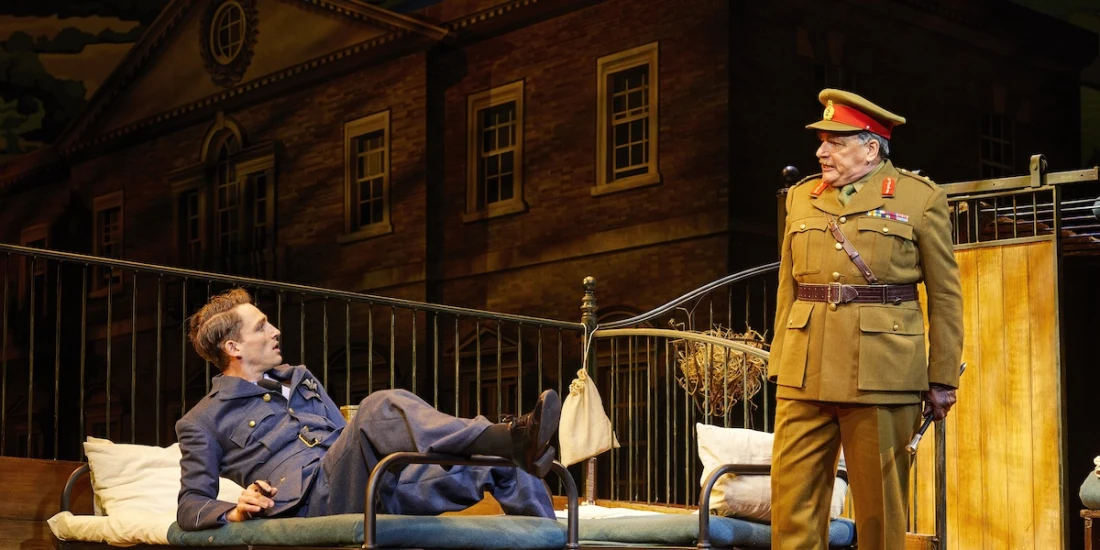'Jack Absolute Flies Again' review — all's farcical in love and war in this vivid retro romp
Is this the next One Man, Two Guvnors? The comparison is inescapable: it’s another updating of a classic work – this time a Boy’s Own version of Sheridan’s 1775 The Rivals – by Richard Bean, collaborating with his One Man, Two Guvnors star Oliver Chris. The Covid-delayed Jack Absolute Flies Again now finally lands successfully in the Olivier, and if it’s not quite a match for Bean’s earlier triumph, it’s still a vivid comic gem.
The action has been transposed to an English stately home in 1940, requisitioned as a base for pilots fighting in the Battle of Britain. But war generally takes a backseat to giddy romantic shenanigans. Hotshot aviator Jack Absolute is in love with Air Transport Auxiliary star Lydia Languish, but she’s got her eye on the oil-streaked Northern mechanic Dudley Scunthorpe, who in turn is wooing the maid Lucy.
Two additional pilots are smitten with Lydia, while Roy is engaged to his cousin Julia, and the widowed Mrs Malaprop, owner of the house and Lydia’s aunt, pounces on Jack’s father Sir Anthony. Of course, this being a farce, even more complications ensue: Jack dresses up as Dudley to trick Lydia, while Lucy, annoyed at being asked to deliver everyone’s love letters, redistributes them for maximum chaos.
The fourth wall is demolished right from the off, as Caroline Quentin introduces herself to the audience (she’s playing the batty old widow, she quips, because “Imelda Staunton was not available”). But our most frequent conspirator is Lucy, who keeps up a scornful running commentary and points out conventions of the genre, while also demanding to know why plays are “always about posh people”.
That latter critique points to the show’s main weakness: rather than doing something about its skewed representation, it reverts to meta gags. Joking that two female characters can only talk about boys doesn’t excuse the fact that, well, they can only talk about boys. Meanwhile Dudley is fetishised as a bluff working-class specimen not just by Lydia but also by the script.
While Lydia deserves to be satirised for that treatment, it’s less entertaining when her desire for female emancipation and an equal marriage of her choosing are likewise mocked, and somewhat dispiriting that she’s manipulated into a class-appropriate match. In fact, the play’s preference to restore everything to the natural order feels oddly conservative.
But if it tips into the kind of cosy nostalgia that it also lampoons (when asked what will happen after winning the war, Sir Anthony hollers “Bunting! Bunting everywhere!”), it’s forgivable when the jokes come so thick and fast, from wordplay and pratfalls to mistaken identities and truly alarming poetry – the latter courtesy of Akshay Sharan’s pilot Bikram Khattri.
There are almost too many malapropisms, but then Quentin takes such glee in delivering them, particular the dirty ones. (The Count of Monte Cristo loses that first ‘o’.) She also reduces the audience to utter hysterics by the means of a ukulele. Peter Forbes (Sir Anthony) is having a ball too as the ultimate red-faced, shouty army officer, who almost fells his son with the sheer force of his roar.
The best physical comedy comes from Jordan Metcalfe and Helena Wilson as the betrothed cousins. When either fears for the other, they lose control of their legs entirely. Metcalfe also astonishingly contorts himself around Forbes when the latter is blocking a doorway, as though his entire body had turned to jelly. Wonderful too are James Corrigan as blithe Aussie Acres and Tim Steed as the closeted Coventry.
Kerry Howard anchors proceedings effectively as the forthright Lucy, while Laurie Davidson and Natalie Simpson are convincing as the arrogant, combative lovers who once bonded during a jitterbug contest. That provides an excuse for a glorious second-half dance-off, brilliantly choreographed by Lizzi Gee. There's even a quick Strictly gag, as former contestants Quentin and Kelvin Fletcher are awarded the 10 paddle.
Emily Burns’s production could use a few more set-pieces like that, or more of the formal flourishes that boosted One Man, Two Guvnors – like the audience interactions and the musical breaks with a live band. Instead, its most ambitious gambit is a massive tonal shift that feels at odds with this innuendo-laden, cricket metaphor-packed, retro romp of a show.
Mark Thompson’s design illustrates the production’s sweet spot: a technicolour combination of comic book and live action, Englishness as an aesthetic and a myth. Jack Absolute is more content to cuddle up to that myth than to seriously challenge it, but as pure summer fizz, it goes down a treat.
Photo credit: Laurie Davidson and Peter Forbes in Jack Absolute Flies Again (Photo by Brinkhoff-Moegenburg)
Originally published on
